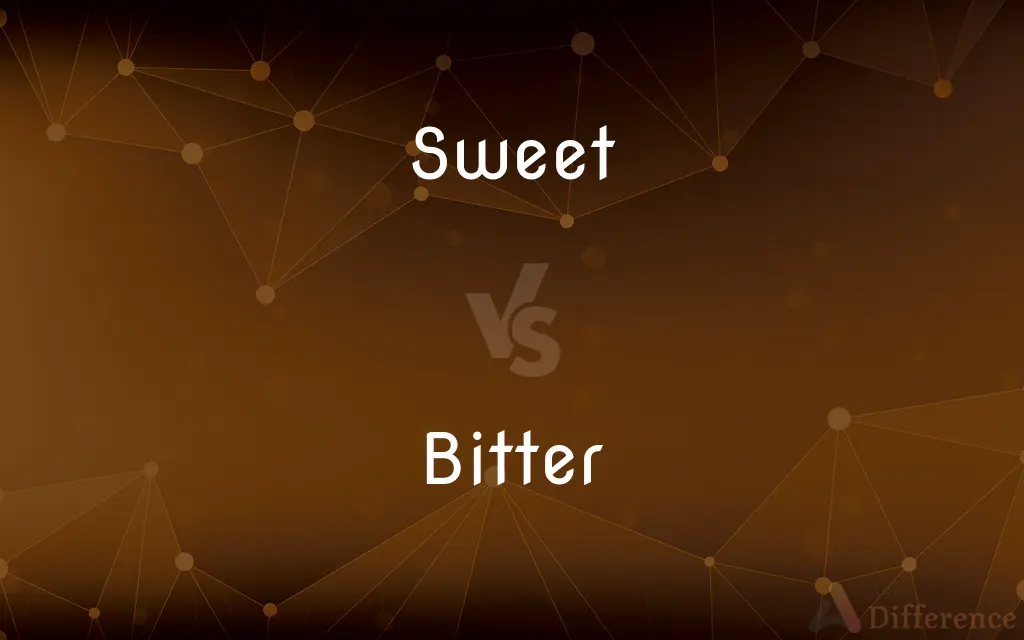Sweet vs. Bitter — What's the Difference?
By Fiza Rafique & Maham Liaqat — Updated on April 18, 2024
Sweet is a taste associated with sugar and pleasurable flavors, often indicative of energy-rich foods; bitter is a taste that can indicate toxins or spoilage, generally considered less palatable but important for its protective roles.

Difference Between Sweet and Bitter
Table of Contents
ADVERTISEMENT
Key Differences
Sweetness is a basic taste sensation often associated with sugar and substances like honey or ripe fruits. It is generally considered pleasurable and is evolutionary linked to identifying energy-rich foods that are safe to eat. On the other hand, bitterness is another basic taste that humans are sensitive to, which often signals the presence of potential toxins or harmful substances in foods, serving as a natural deterrent.
While sweet tastes are usually perceived as pleasant and are often sought after in foods and beverages, such as desserts and soft drinks, bitter tastes are usually less desirable and are often masked with other flavors in culinary applications. However, some cultures appreciate the complexity that bitter flavors bring to dishes and beverages like coffee, dark chocolate, and certain vegetables.
The sensation of sweetness is primarily triggered by the presence of sugars and certain proteins, and it can also be simulated by artificial sweeteners. Bitterness, however, is triggered by a diverse array of compounds, including alkaloids and other plant toxins, which are perceived through different receptors on the tongue.
In terms of health implications, consuming moderate amounts of sweet foods can provide necessary energy, but excessive intake can lead to health issues like diabetes and obesity. Conversely, bitter substances often have medicinal properties and can stimulate digestion and other bodily functions, although they can also be toxic in high concentrations.
Sweet flavors are often associated with comfort and rewards, frequently featured in treats and celebratory foods. Bitter tastes, while less universally popular, are appreciated in many cultures for their depth and are believed to contribute to the balance and complexity of flavors in a diet.
ADVERTISEMENT
Comparison Chart
Taste
Pleasurable, associated with sugar.
Less palatable, associated with toxins.
Common Sources
Sugars, honey, ripe fruits.
Alkaloids, caffeine, certain vegetables.
Perception
Triggered by sugars and sweeteners.
Triggered by diverse compounds.
Health Impact
Provides energy, risk of overconsumption.
Medicinal properties, can be toxic.
Cultural Significance
Associated with comfort and rewards.
Appreciated for complexity and balance.
Compare with Definitions
Sweet
Taste sensation caused by sugars, perceived as enjoyable.
She loves the sweet taste of maple syrup on her pancakes.
Bitter
Taste sensation evoked by various compounds, often considered averse.
The bitter taste of raw cocoa is mellowed by sugar in chocolate.
Sweet
Often indicates high energy content in foods.
Sweet fruits like mangoes and bananas are rich in natural sugars.
Bitter
Can indicate spoilage or toxicity in foods.
Bitterness in certain wild berries can signal they are not ripe or are toxic.
Sweet
Can be mimicked by artificial sweeteners.
Many diet sodas use artificial sweeteners to achieve a sweet taste without calories.
Bitter
Sometimes associated with health benefits.
The bitter compounds in kale are linked with numerous health benefits.
Sweet
Commonly found in desserts and beverages.
He added some sweet cream to his coffee to enhance its flavor.
Bitter
Found in coffee, dark chocolate, and certain vegetables.
The bitter flavor of Brussels sprouts can be tempered with roasting.
Sweet
Culturally linked to pleasure and indulgence.
Sweet treats are a staple at celebrations and special occasions.
Bitter
Appreciated in many cultures for dietary balance.
Bitter flavors are essential in balancing the richness of foods in many Asian cuisines.
Sweet
Having the pleasant taste characteristic of sugar or honey; not salt, sour, or bitter
A cup of hot sweet tea
Bitter
Having or being a taste that is sharp, acrid, and unpleasant.
Sweet
Pleasing in general; delightful
It was the sweet life he had always craved
Bitter
Causing a sharply unpleasant, painful, or stinging sensation; harsh
Enveloped in bitter cold.
A bitter wind.
Sweet
(of a person or action) pleasant and kind or thoughtful
It was sweet of you to come
A very sweet nurse came along
Bitter
Difficult or distasteful to accept, admit, or bear
The bitter truth.
Bitter sorrow.
Sweet
Used for emphasis in various phrases and exclamations
What had happened? Sweet nothing
Bitter
Proceeding from or exhibiting strong animosity
A bitter struggle.
Bitter foes.
Sweet
A small shaped piece of confectionery made with sugar
A bag of sweets
Bitter
Resulting from or expressive of severe grief, anguish, or disappointment
Cried bitter tears.
Sweet
A sweet dish forming a course of a meal; a pudding or dessert.
Bitter
Marked by resentment or cynicism
"He was already a bitter elderly man with a gray face" (John Dos Passos).
Sweet
Used as an affectionate form of address
Hello, my sweet
Bitter
In an intense or harsh way; bitterly
A bitter cold night.
Sweet
The sweet part or element of something
You have had the bitter, now comes the sweet
Bitter
To make bitter.
Sweet
Having the taste of sugar or a substance containing or resembling sugar, as honey or saccharin.
Bitter
That which is bitter
"all words ... / Failing to give the bitter of the sweet" (Tennyson).
Sweet
Containing or derived from sugar.
Bitter
Bitters A bitter, usually alcoholic liquid made with herbs or roots and used in cocktails or as a tonic.
Sweet
Retaining some natural sugar; not dry
A sweet wine.
Bitter
Chiefly British A sharp-tasting beer made with hops.
Sweet
Pleasing to the senses; agreeable
The sweet song of the lark.
A sweet face.
Bitter
Having an acrid taste (usually from a basic substance).
The coffee tasted bitter.
Sweet
Pleasing to the mind or feelings; gratifying
Sweet revenge.
Bitter
Harsh, piercing or stinging.
Sweet
Having a pleasing disposition; lovable
A sweet child.
Bitter
Hateful or hostile.
They're bitter enemies.
Sweet
Kind; gracious
It was sweet of him to help out.
Bitter
Cynical and resentful.
I've been bitter ever since that defeat.
Sweet
Fragrant; perfumed
A sweet scent.
Bitter
(usually in the plural bitters) A liquid or powder, made from bitter herbs, used in mixed drinks or as a tonic.
Sweet
Not saline or salted
Sweet water.
Sweet butter.
Bitter
A type of beer heavily flavored with hops.
Sweet
Not spoiled, sour, or decaying; fresh
Sweet milk.
Bitter
(nautical) A turn of a cable about the bitts.
Sweet
Free of acid or acidity
Sweet soil.
Bitter
A hardware system whose architecture is based around units of the specified number of bits binary digits.
Sweet
Low in sulfur content
Sweet fuel oil.
Bitter
To make bitter.
Sweet
(Music) Of, relating to, or being a form of jazz characterized by adherence to a melodic line and to a time signature.
Bitter
AA turn of the cable which is round the bitts.
Sweet
Remarkable; outstanding.
Bitter
Any substance that is bitter. See Bitters.
Sweet
Used as an intensive
Took his own sweet time to finish.
Earns a sweet million per year.
Bitter
Having a peculiar, acrid, biting taste, like that of wormwood or an infusion of hops; as, a bitter medicine; bitter as aloes.
Sweet
In a sweet manner; sweetly.
Bitter
Causing pain or smart; piercing; painful; sharp; severe; as, a bitter cold day.
Sweet
Sweet taste or quality; sweetness.
Bitter
Causing, or fitted to cause, pain or distress to the mind; calamitous; poignant.
It is an evil thing and bitter, that thou hast forsaken the Lord thy God.
Sweet
Something sweet to the taste.
Bitter
Characterized by sharpness, severity, or cruelty; harsh; stern; virulent; as, bitter reproach.
Husbands, love your wives, and be not bitter against them.
Sweet
Foods, such as candy, pastries, puddings, or preserves, that are high in sugar content.
Bitter
Mournful; sad; distressing; painful; pitiable.
The Egyptians . . . made their lives bitter with hard bondage.
Sweet
(Informal) Sweet potatoes
Candied sweets.
Bitter
To make bitter.
Sweet
A sweet dish, such as pudding, served as dessert.
Bitter
English term for a dry sharp-tasting ale with strong flavor of hops (usually on draft)
Sweet
A sweetmeat or confection.
Bitter
The taste experience when quinine or coffee is taken into the mouth
Sweet
A dear or beloved person.
Bitter
The property of having a harsh unpleasant taste
Sweet
Something pleasing to the mind or feelings.
Bitter
Make bitter
Sweet
Having a pleasant taste, especially one relating to the basic taste sensation induced by sugar.
A sweet apple
Bitter
Marked by strong resentment or cynicism;
An acrimonious dispute
Bitter about the divorce
Sweet
Having a taste of sugar.
Bitter
Very difficult to accept or bear;
The bitter truth
A bitter sorrow
Sweet
(wine) Retaining a portion of sugar.
Sweet wines are better dessert wines.
Bitter
Harsh or corrosive in tone;
An acerbic tone piercing otherwise flowery prose
A barrage of acid comments
Her acrid remarks make her many enemies
Bitter words
Blistering criticism
Caustic jokes about political assassination, talk-show hosts and medical ethics
A sulfurous denunciation
Sweet
Not having a salty taste.
Sweet butter
Bitter
One of the four basic taste sensations; sharp and disagreeable; like the taste of quinine
Sweet
Having a pleasant smell.
A sweet scent
Bitter
Expressive of severe grief or regret;
Shed bitter tears
Sweet
Not decaying, fermented, rancid, sour, spoiled, or stale.
Sweet milk
Bitter
Proceeding from or exhibiting great hostility or animosity;
A bitter struggle
Bitter enemies
Sweet
Having a pleasant sound.
A sweet tune
Bitter
Causing a sharply painful or stinging sensation; used especially of cold;
Bitter cold
A biting wind
Sweet
Having a pleasing disposition.
A sweet child
You're so sweet!
Bitter
Extremely and sharply;
It was bitterly cold
Bitter cold
Sweet
Having a helpful disposition.
It was sweet of him to help out.
Sweet
(mineralogy) Free from excessive unwanted substances like acid or sulphur.
Sweet gas
Sweet soil
Sweet crude oil
Sweet
(informal) Very pleasing; agreeable.
The new Lexus was a sweet birthday gift.
Sweet
(slang) Doing well; in a good or happy position.
Sweet
Romantically fixated; enamored with; fond of.
The attraction was mutual and instant; they were sweet on one another from first sight.
Sweet
; not salt or brackish.
Sweet water
Sweet
To the eye; beautiful; mild and attractive; fair.
A sweet face
A sweet colour or complexion
Sweet
An intensifier.
Sweet
Used as a positive response to good news or information.
They're making a sequel? Ah, sweet!
Sweet
In a sweet manner.
Sweet
(uncountable) The basic taste sensation induced by sugar.
Sweet
A confection made from sugar, or high in sugar content; a candy.
Sweet
A food eaten for dessert.
Can we see the sweet menu, please?
Sweet
Synonym of sweetheart, a term of affection.
Good evening, my sweet.
Sweet
(obsolete) That which is sweet or pleasant in odour; a perfume.
Sweet
(obsolete) Sweetness, delight; something pleasant to the mind or senses.
Sweet
To sweeten.
Sweet
Having an agreeable taste or flavor such as that of sugar; saccharine; - opposed to sour and bitter; as, a sweet beverage; sweet fruits; sweet oranges.
Sweet
Pleasing to the smell; fragrant; redolent; balmy; as, a sweet rose; sweet odor; sweet incense.
The breath of these flowers is sweet to me.
Sweet
Pleasing to the ear; soft; melodious; harmonious; as, the sweet notes of a flute or an organ; sweet music; a sweet voice; a sweet singer.
To make his English sweet upon his tongue.
A voice sweet, tremulous, but powerful.
Sweet
Pleasing to the eye; beautiful; mild and attractive; fair; as, a sweet face; a sweet color or complexion.
Sweet interchangeOf hill and valley, rivers, woods, and plains.
Sweet
Fresh; not salt or brackish; as, sweet water.
Sweet
Not changed from a sound or wholesome state. Specifically: (a) Not sour; as, sweet milk or bread. (b) Not state; not putrescent or putrid; not rancid; as, sweet butter; sweet meat or fish.
Sweet
Plaesing to the mind; mild; gentle; calm; amiable; winning; presuasive; as, sweet manners.
Canst thou bind the sweet influence of Pleiades?
Mildness and sweet reasonableness is the one established rule of Christian working.
Sweet
That which is sweet to the taste; - used chiefly in the plural.
Sweet
That which is sweet or pleasant in odor; a perfume.
Sweet
That which is pleasing or grateful to the mind; as, the sweets of domestic life.
A little bitter mingled in our cup leaves no relish of the sweet.
Sweet
One who is dear to another; a darling; - a term of endearment.
Sweet
Sweetly.
Sweet
To sweeten.
Sweet
English phonetician; one of the founders of modern phonetics (1845-1912)
Sweet
A dish served as the last course of a meal
Sweet
A food rich in sugar
Sweet
The taste experience when sugar dissolves in the mouth
Sweet
The property of containing sugar
Sweet
Having a pleasant taste (as of sugar)
Sweet
Having a sweet nature befitting an angel or cherub;
An angelic smile
A cherubic face
Looking so seraphic when he slept
A sweet disposition
Sweet
Pleasing to the ear;
The dulcet tones of the cello
Sweet
One of the four basic taste sensations; very pleasant; like the taste of sugar or honey
Sweet
Pleasing to the senses;
The sweet song of the lark
The sweet face of a child
Sweet
Pleasing to the mind or feeling;
Sweet revenge
Sweet
Having a natural fragrance;
Odoriferous spices
The odorous air of the orchard
The perfumed air of June
Scented flowers
Sweet
(used of wines) having a sweet taste
Sweet
Not soured or preserved;
Sweet milk
Sweet
With sweetening added
Sweet
Not having a salty taste;
Sweet water
Sweet
In an affectionate or loving manner (`sweet' is sometimes a poetic or informal variant of `sweetly');
Susan Hayward plays the wife sharply and sweetly
How sweet the moonlight sleeps upon this bank
Talking sweet to each other
Common Curiosities
Are sweet foods always unhealthy?
Not necessarily; while excessive consumption of sugary foods is unhealthy, natural sweet foods like fruits contain important nutrients.
What causes foods to taste sweet or bitter?
Sweet tastes are usually caused by sugars and artificial sweeteners, while bitter tastes are caused by diverse chemical compounds including alkaloids.
Can someone like bitter tastes?
Yes, many people appreciate bitter tastes, which can add complexity and depth to foods and beverages.
Can sweetness be a warning sign of a health issue?
Yes, an abnormally sweet taste in foods or in the mouth can sometimes indicate health issues, such as diabetes.
How can I reduce bitterness in my cooking?
Bitterness can be reduced by cooking methods such as blanching, or by combining bitter foods with sweet or acidic flavors.
What are some health benefits of bitter foods?
Bitter foods often contain health-promoting compounds that can stimulate digestion and offer antioxidant properties.
Why do we like sweet tastes more than bitter?
Sweet tastes are evolutionarily linked to safe, energy-rich foods, making them more universally appealing compared to bitter tastes, which can signal danger.
What is the role of artificial sweeteners in sweetness?
Artificial sweeteners provide a sweet taste without the calories associated with sugar, often used in weight management and diabetic diets.
Do children naturally dislike bitter tastes?
Children are often more sensitive to bitter tastes, which is thought to be a protective mechanism against ingesting harmful substances.
Can the taste preferences for sweet and bitter be changed?
Yes, taste preferences can change over time and with exposure to different flavors and cuisines.
Is there a cultural significance to bitter foods?
Yes, in many cultures, bitter foods are considered important for their medicinal properties and as a counterbalance to other flavors in the diet.
Are there bitter sweeteners?
While some sweeteners might have a mildly bitter aftertaste, most commercially used sweeteners are purely sweet.
Why are sweet foods popular at celebrations?
Sweet foods are often associated with pleasure and indulgence, making them popular choices for festive and celebratory occasions.
How does human evolution influence our taste preferences?
Humans have evolved to seek out sweet tastes due to their association with energy-rich foods and to avoid bitter tastes as they often signal toxins.
What are some examples of bitter medicines?
Many medicines, especially those derived from plants like quinine, are known for their bitter taste, which is often masked in commercial formulations.
Share Your Discovery

Previous Comparison
Bulldog vs. Pug
Next Comparison
Snow vs. HailAuthor Spotlight
Written by
Fiza RafiqueFiza Rafique is a skilled content writer at AskDifference.com, where she meticulously refines and enhances written pieces. Drawing from her vast editorial expertise, Fiza ensures clarity, accuracy, and precision in every article. Passionate about language, she continually seeks to elevate the quality of content for readers worldwide.
Co-written by
Maham Liaqat













































